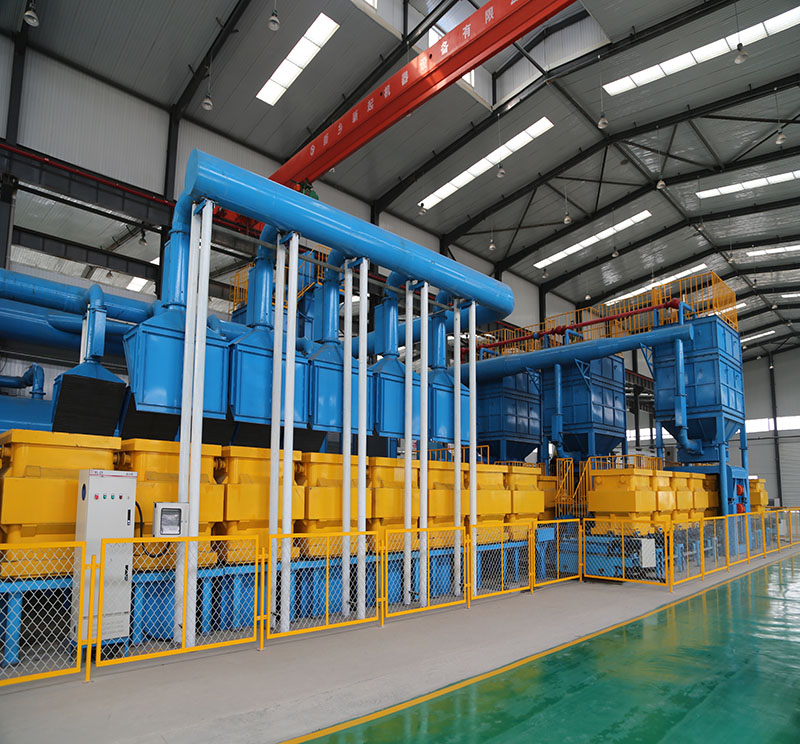Why Lost Foam Casting Line Is the Smartest Investment for Foundries in 2025
Introduction — The Pressure on Modern Foundries
In 2025, foundries around the world are facing a triple threat: rising labor costs, tightening environmental regulations, and increasing customer demands for precision. Whether you're producing automotive components or heavy machinery castings, staying competitive means rethinking your production strategy.
So, what’s the smartest investment a foundry can make right now?
Enter the Lost Foam Casting Line — a game-changing solution that simplifies workflow, reduces cost over time, and delivers high-quality, complex castings with impressive consistency.What Is Lost Foam Casting – And Why Does It Matter Now?
Lost Foam Casting is a near-net-shape casting process that uses foam patterns, which are vaporized during the metal pour. The molten metal takes the exact shape of the evaporating foam, producing detailed and dimensionally accurate castings without the need for cores or multiple mold parts.
In 2025, the demand for complex, lightweight, and precise metal components has never been higher — making Lost Foam Casting the ideal solution for modern manufacturing.
Common Problems Faced by Traditional Casting Lines
If you're still using traditional green sand or shell mold processes, you're likely facing some of these headaches:
High labor dependency: Skilled workers are harder to find and retain.
Multiple process steps: Mold preparation, core setting, mold closing — it adds up.
Low dimensional accuracy: More post-processing, more time, more money.
Dusty, dirty working environment: Increasing health and environmental concerns.
Difficulty producing complex geometries: Especially in a single pour.
How Lost Foam Casting Line Solves These Problems
Reduces Labor Dependency
With automation-integrated equipment — from pattern assembly to vibration compaction and pouring systems — a Lost Foam line can significantly reduce the need for manual operations.
Improves Casting Precision
Lost Foam delivers excellent surface finish and tight dimensional tolerance, minimizing the need for secondary machining.
Simplifies Workflow
No need for sand cores or mold splitting. The foam pattern stays in place, and the process is more streamlined.
Cleaner & Greener
Dry sand, less waste, and reduced emissions create a better working environment and make environmental compliance easier.
Cost-Effective Over Time
While the initial investment may seem higher than traditional lines, the long-term ROI is strong — thanks to lower labor costs, improved yield, and less rework.
Comparative Table: Lost Foam vs. Traditional Casting
| Key Factor | Traditional Casting | Lost Foam Casting |
|---|---|---|
| Labor Requirement | High (manual core setting, mold closing) | Low (automated pattern assembly and pouring) |
| Dimensional Accuracy | Moderate, requires secondary machining | High, near-net-shape with minimal post-processing |
| Complex Geometry | Difficult and costly | Easily achievable with one-piece foam patterns |
| Tooling Flexibility | Low; retooling is complex | High; rapid pattern prototyping possible |
| Environmental Cleanliness | Dusty, high emission from sand binders | Cleaner, dry sand used without chemical binders |
| Production Speed | Slower due to multiple steps | Faster, fewer process stages |
| Initial Setup Cost | Lower upfront cost | Higher upfront cost but lower long-term expense |
| Ideal for | Simple, high-volume parts | Complex, medium-to-high precision castings |
Real-World Examples: Foundries Benefiting from Lost Foam
Case 1: Automotive Parts Manufacturer – India
Switched to Lost Foam for producing aluminum engine blocks. Result:
27% reduction in labor cost
18% increase in casting yield
Improved part accuracy led to a 35% reduction in machining time
Case 2: Agricultural Machinery Supplier – Brazil
Implemented a mid-size Lost Foam line for complex gearbox housings.
Cut production time by 22%
Enhanced product consistency
Enabled in-house casting instead of outsourcing
These companies didn’t just upgrade their technology — they gained a long-term competitive edge.
Conclusion – Don’t Miss the Smartest Upgrade of the Year
2025 is not the year to fall behind. Lost Foam Casting Lines offer foundries a powerful tool to modernize, reduce costs, and meet the demands of tomorrow’s manufacturing landscape.
Whether you're planning a full facility upgrade or exploring flexible production lines, Lost Foam is the investment that pays back — in quality, in efficiency, and in customer satisfaction.
? Ready to take the next step?
Let’s talk about your production goals. Contact us for a custom assessment or schedule a demo.



